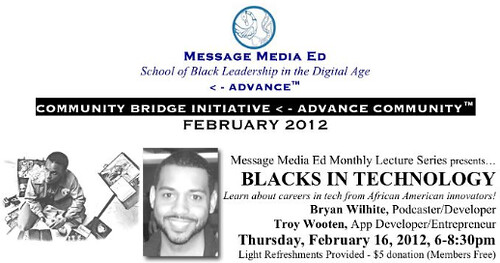Message Media ED Talking Points
Here are my talking points for the upcoming talk. I do not expect to hit even 5% of what’s written here but this may serve as guide for what I should have said. As always, when I send you something I welcome feedback—I’ve never expected to grandstand and perform alone. Just like any child at play, I have the traditional expectation that, whatsoever I do, others can do just as well and often better.
General Preamble
- The “mainstream” is a polluted river, an unsustainable environment. Speaking “outside of the mainstream” often means you are investing in the future of universe—not your next paycheck.
- Most technical people “of color” worked in cultural isolation and risk getting too comfortable with being alone or functioning in a social scene where they are the only person “of color.” The need to be collective is not just a pretty ideal from the 1960s. It is a mental health exercise.
- The ethnic origin of my intellect is not European—this is not an outburst of irresponsible hatred but a carefully considered revelation that has taken decades for me to see.
- Recommended reading Black Life in Corporate America. This book takes testimony from the previous generation.
Answering Dr. Shani
- My current title is “Silverlight Consultant”—I’m a contractor for 20th Century Fox Filmed Entertainment. I am not a permanent employee—this means that I have to pay for medical insurance with my own money. This also leads me to the topic of “at will employment”—which means that I can walk in to the office on any work day and be told that my contract is cancelled. Since the end of legal slavery in the United States, it’s an American tradition to find me early and often to tell me that my contract is cancelled!
- My educational journey—and my professional career—are dominated by Black women. This means that—as far as I am concerned—I have a classical African education. When I went to UCSB, I knew I was there because they had all of the material equipment—access to physical resources. All of the metaphysical came from deliberate preparation and attention from my family and the Black activist educational community of that time. When crack cocaine hit hard during my teens in the 1980s all of this went away—and the extreme isolation began which has never ended to this very day.
- The first person to help me was my mother. All people come through women so it is natural that women should know all people—this is fundamental theme of traditional, pre-Columbian Black Africa—and this ancient ideal was glimmering faintly and brightly in my mother. My mother taught me personally how to read. As far as I am concerned, it is a sign of wealth and prestige for a child to be taught directly by his parents—this working class American tradition of parents leaving their children with strangers for hours per day for years is the greatest rip off of “modern” humanity. My father made it possible for my mother to teach me because he went to work to provide a home for my older brother, me and my mother. My father was an aircraft mechanic for Western Airlines—so as a child I could look up at the sky, see a huge airplane and know that my father worked on it to make fly. We often forget that Compton has an airport—my father was flight instructor there for years (my father’s teacher, by the way, was taught by one of the Tuskegee Airmen). My father built a train set that took up half the garage for me and my brother—so I was motivated to become technical at an early age. I used to sit out by myself there in that garage in my robe and pajamas trying to get the trains to run—this is the earliest stage in my life where having technical skills became important to me. My father is also a Bible scholar and he unintentionally introduced me to critical thinking and literary criticism by going over scripture with me. But then my mother and father divorced—my brother flipped out and became “the man of the house” which led him to gangs and then crack cocaine hit… My mother and father were both teachers. My mother got her teaching credentials and masters so she was very involved in the K-through-12 educational scene of the 1970s and 1980s. My mother became a nerd of sorts about finding often very exotic educational programs for children—she even barged her way into getting me into the Korean YMCA one summer! There were two very important institutions she got me into: The Museum of Science and Industry and the King/Drew Medical Magnet—both of these environments exposed me formally to the world of computers.
- The traditions of the place we now call Africa are the key to my personal sanity—my personal mental health—and the deep reservoir of biofuel that powers my intellect. This power allows me view the Western world from outside of its worldview—and inside of it simultaneously. To give you an example of how far you can fly with such personal, internal freedom I remind us of the name Kwabena Boahen of Stanford University. He says plainly, “there is not enough Africa in the computer.” See his TED Talk that took place in 2007 in Arusha, Tanzania.

